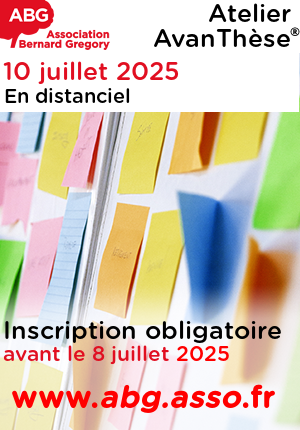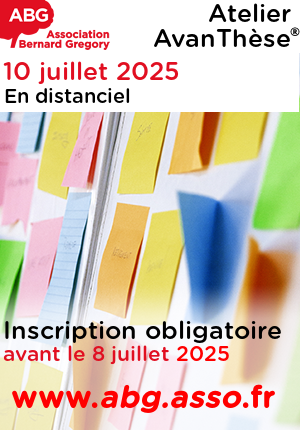Gérer les tensions individuelles et collectives dans le cadre d'un changement alimentaire collaboratif: mécanismes et conséquences du coaching virtuel assisté par l'IA // Navigating Individual–Collective Tensions in Collaborative Dietary Change: Mechanism
|
ABG-132418
ADUM-66446 |
Sujet de Thèse | |
| 07/06/2025 | Autre financement public |
Université Grenoble Alpes
Saint Martin D'Heres - Auvergne-Rhône-Alpes - France
Gérer les tensions individuelles et collectives dans le cadre d'un changement alimentaire collaboratif: mécanismes et conséquences du coaching virtuel assisté par l'IA // Navigating Individual–Collective Tensions in Collaborative Dietary Change: Mechanism
- Sociologie, anthropologie, sciences de l’éducation
changememnt de comportement, agent socialement intelligent, collaboration, IA générative
behavior change, socially intelligent ai, collaboration, Generative AI
behavior change, socially intelligent ai, collaboration, Generative AI
Description du sujet
Ce projet de recherche doctorale, financé par la Chaire IA Transformative et Changement Social (TrAI-SoC) de MIAI Cluster, vise à étudier les tensions individuelles et collectives qui apparaissent lorsque deux individus étroitement liés (copains) modifient leurs habitudes alimentaires de manière collaborative, avec l'aide d'un Agent Socialement Intelligent (ASI) faisant office de coach nutritionnel virtuel.
L'étude explorera les mécanismes sous-jacents et l'influence de ces tensions sur l'engagement, l'expérience, le bien-être et la réalisation des objectifs des utilisateurs, et les moyens de les atténuer.
Le projet adoptera une approche mixte, combinant expérimentations en laboratoire et entretiens semi-directs.
------------------------------------------------------------------------------------------------------------------------------------------------------------------------
------------------------------------------------------------------------------------------------------------------------------------------------------------------------
This doctoral research project, funded by the Transformative AI & Social Change (TrAI-SoC) Chair, MIAI Cluster, aims to investigate the individual-collective tensions that arise when two closely associated individuals (buddies) collaboratively modify their dietary habits with the guidance of a Socially Intelligent Agent (SIA) functioning as a virtual nutritional coach.
The study will explore how these tensions emerge and influence user engagement, experience, well-being, and goal achievement, and how they can be mitigated.
The project will adopt a mixed-methods approach, combining lab experiments and semi-direct interviews.
------------------------------------------------------------------------------------------------------------------------------------------------------------------------
------------------------------------------------------------------------------------------------------------------------------------------------------------------------
Début de la thèse : 01/10/2025
L'étude explorera les mécanismes sous-jacents et l'influence de ces tensions sur l'engagement, l'expérience, le bien-être et la réalisation des objectifs des utilisateurs, et les moyens de les atténuer.
Le projet adoptera une approche mixte, combinant expérimentations en laboratoire et entretiens semi-directs.
------------------------------------------------------------------------------------------------------------------------------------------------------------------------
------------------------------------------------------------------------------------------------------------------------------------------------------------------------
This doctoral research project, funded by the Transformative AI & Social Change (TrAI-SoC) Chair, MIAI Cluster, aims to investigate the individual-collective tensions that arise when two closely associated individuals (buddies) collaboratively modify their dietary habits with the guidance of a Socially Intelligent Agent (SIA) functioning as a virtual nutritional coach.
The study will explore how these tensions emerge and influence user engagement, experience, well-being, and goal achievement, and how they can be mitigated.
The project will adopt a mixed-methods approach, combining lab experiments and semi-direct interviews.
------------------------------------------------------------------------------------------------------------------------------------------------------------------------
------------------------------------------------------------------------------------------------------------------------------------------------------------------------
Début de la thèse : 01/10/2025
Nature du financement
Autre financement public
Précisions sur le financement
ANR Financement d'Agences de financement de la recherche
Présentation établissement et labo d'accueil
Université Grenoble Alpes
Etablissement délivrant le doctorat
Université Grenoble Alpes
Ecole doctorale
275 EDSG - Sciences de gestion
Profil du candidat
Le/La doctorant(e) doit être titulaire d'un master recherche, de préférence en marketing, psychologie ou sciences cognitives.
• Compétences en comportement du consommateur, sciences cognitives, psychologie sociale: compréhension des théories sociales, analyse des interactions humaines (influence sociale, communication non verbale et biais cognitifs et cognitifs); perception et évaluation sociale.
• Compétences méthodologiques et analytiques: conception expérimentale avancée; analyse statistique; évaluation qualitative et quantitative: compétence en collecte et analyse de données qualitatives (par exemple, entretiens, enquêtes) et quantitatives (par exemple, comportements mesurables).
• Expérience ou appétence en collaboration pluridisciplinaire.
• Compétences relationnelles: maîtrise avérée des techniques de communication scientifique écrite et orale; autonomie, capacité de décision, adaptabilité, sens de l'initiative et sens de l'organisation.
• Compétences techniques: compétences en informatique ou en IA seraient un plus.
The doctoral candidate must have a Research Master's degree, preferably in marketing, psychology or cognitive sciences Skills in Consumer behavior, cognitive sciences, social psychology: understanding of social theories, analysis of human interaction (social influence, nonverbal communication and cognitive and cognitive biases); perception and social evaluation. • Methodological and analytical skills: advanced experimental design; statistical analysis; qualitative and quantitative evaluation: competence in collecting and analyzing qualitative (e.g., interviews, surveys) and quantitative (e.g., measurable behaviors) data. • Interdisciplinary collaboration experience or appetence • Soft skills: proven abilities of written and oral scientific communication techniques; autonomy, decision-making ability, adaptability, good initiative and organizational skills. • Hard skills: competencies in computer sciences or AI would be a plus
The doctoral candidate must have a Research Master's degree, preferably in marketing, psychology or cognitive sciences Skills in Consumer behavior, cognitive sciences, social psychology: understanding of social theories, analysis of human interaction (social influence, nonverbal communication and cognitive and cognitive biases); perception and social evaluation. • Methodological and analytical skills: advanced experimental design; statistical analysis; qualitative and quantitative evaluation: competence in collecting and analyzing qualitative (e.g., interviews, surveys) and quantitative (e.g., measurable behaviors) data. • Interdisciplinary collaboration experience or appetence • Soft skills: proven abilities of written and oral scientific communication techniques; autonomy, decision-making ability, adaptability, good initiative and organizational skills. • Hard skills: competencies in computer sciences or AI would be a plus
25/06/2025
Postuler
Fermer
Vous avez déjà un compte ?
Nouvel utilisateur ?
Besoin d'informations sur l'ABG ?
Vous souhaitez recevoir nos infolettres ?
Découvrez nos adhérents
 ASNR - Autorité de sûreté nucléaire et de radioprotection - Siège
ASNR - Autorité de sûreté nucléaire et de radioprotection - Siège  ADEME
ADEME  TotalEnergies
TotalEnergies  CESI
CESI  Institut Sup'biotech de Paris
Institut Sup'biotech de Paris  Nokia Bell Labs France
Nokia Bell Labs France  Ifremer
Ifremer  Tecknowmetrix
Tecknowmetrix  PhDOOC
PhDOOC  Aérocentre, Pôle d'excellence régional
Aérocentre, Pôle d'excellence régional  Généthon
Généthon  ANRT
ANRT  Groupe AFNOR - Association française de normalisation
Groupe AFNOR - Association française de normalisation  SUEZ
SUEZ  Laboratoire National de Métrologie et d'Essais - LNE
Laboratoire National de Métrologie et d'Essais - LNE  ONERA - The French Aerospace Lab
ONERA - The French Aerospace Lab  MabDesign
MabDesign  MabDesign
MabDesign  CASDEN
CASDEN







